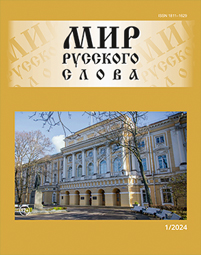Means of Representing the Concept of “Travel” as a Concept in Russian, English and Chinese Linguocultures
DOI:
https://doi.org/10.21638/spbu30.2024.103Abstract
The article is devoted to the features of the use of means of representing the concept of “travel” as a concept in Russian, English and Chinese linguistic cultures. The empirical basis for the analysis were the texts of literary works of Russian, English and Chinese authors of the 18th century. The choice of this period was made due to the absence of intensive globalization in that time, including linguistics, which allows one to speak about the minimal impact of the external environment on the formation of the same concept and the maximum level of reflection in it of the national specifics of the represented linguistic cultures. Fundamentally different linguistic cultures were chosen as the basis for the study: Russian, English and Chinese. The study reveals the need to use an interdisciplinary approach in linguistics, the possibilities of which can be realized through the study of verbal representatives of the concept in question in languages of different structure. The research is using methods of content analysis, comparative analysis, synthesis, and modeling. A comprehensive analysis consisting of three stages was carried out. At the first stage, the categories of the concept were described, denoting journey, end points, means of transportation, units of measurement, which made it possible to identify the semantic volume of the concept, i. e. its core zone. At the second stage, a contextual analysis of additional features of this concept was carried out, which are determined by the peculiarities of the geographical location and social structure of the three countries. At the third stage, the peripheral zone of the concept under consideration was explored, revealing its representation using expressive means. At the end of the study, it was proven that national linguocultural features determine the specificity of the means of representing the concept of “travel” in the works “Journey from St. Petersburg to Moscow” by Alexander N. Radishchev, “Journey to the West” by Wu Cheng’en and “Robinson Crusoe” by Daniel Defoe.
Keywords:
linguo-cultural concept, travel, conceptual structure, concept language representation means, linguistics and culture
Downloads
References
Черепанова 2006 — Черепанова Н. В. Путешествие как феномен культуры. Автореф. дис. … канд. филос. наук. Томск, 2006. 19 с.
Downloads
Published
How to Cite
Issue
Section
License
Articles of "The World of Russian Word" are open access distributed under the terms of the License Agreement with Saint Petersburg State University, which permits to the authors unrestricted distribution and self-archiving free of charge.




